人教版高中英语必修5全册教案
2019_2020学年高中英语Unit5FirstaidPeriodFourGrammar—Ellipsis教案(含解析)新人教版必修5

Period Four Grammar—Ellipsis感知以下课文原句,补全方框下的小题1.句1和句4为简单句中的省略,句1中在first和second后省略了degree;句4中在becoming 前省略了from。
2.句2,3和5为状语从句的省略。
当状语从句的主语和主句的主语一致,或当状语从句的主语为it,而且从句谓语中含有be动词时,可以把从句的主语和be动词一起省略。
一、什么是省略1.省略是一种避免重复、保持简洁的语法手段。
2.凡是缺少一个或一个以上的必要语言成分,但在一定语境中能够独立存在,意义明确,并且能发挥交际功能的句子就是省略句。
二、省略的分类(一)简单句中的省略1.省略主语:一般情况下,主语是不能省略的,但在祈使句和其他不容易引起歧义的情况下,特别是在口语中,常常省略主语,主要是祈使句中的you和疑问句中的主语。
(You) Shutup!住嘴!(It) Doesn’tmatter.没关系。
2.省略宾语:当上、下或前、后两个句子的宾语一致时,下句或后句常省略宾语。
—DoyouknowMissGao?—Idon’tknow (her).——你认识高女士吗?——不认识。
3.省略主语和谓语(或谓语的一部分):在某些具体的场合下,主语和谓语都很明确,此时为了简化或显得亲切等,可将主语和谓语(或谓语的一部分)同时省略,只剩下表语、宾语、状语或其他成分。
(Youcome) Thisway,please.请这边走。
(省略了主语和谓语)(Haveyou) Gotanyink?你有墨水吗?(省略了主语和谓语的一部分)(二)并列句中的省略一般来说,在后一并列句中凡是与上文相同的成分通常都要省略。
Myroomisonthefifthfloor,andhers (is) ontheeighth (floor).我的房间在五楼,而她的在八楼。
(三)复合句中的省略1.状语从句中的省略当状语从句的主语和主句的主语一致或从句的主语为it,且从句谓语中含有be动词时,省略状语从句中的主语和be动词。
人教版高中英语必修五第二单元教案

Period 5 GrammarThe General Idea of This PeriodThis period lays emphasis on grammar, that is, the past participle used as the object complement, which is also one of the difficult points in Senior English grammar.First, revise what the students have learnt in the last period by checking their homework , including some important phrases and translating some sentences from Chinese into English.In this unit the students should learn about the past particip le used as the object complement. First, the teacher presents one sentence containing a past participle used the object complement, which was taken from the reading passage.Teacher tries to analyze the function of the past participle and help the students have a general idea about it.Then the students are asked to find all the sentences that contain a past participle used as the object complement in the Reading passage.Then the students can come to a conclusion of the basic structure of the past participle1used as the object complement, that is, have/get/find/...+object +past participle.Next the teacher will explain the differences between the present participle and the past participle.The teacher compares them when are used as the attributive, predicate, object complement and adverbial.In order to do so, the teacher always shows some typical examples.After that, the students will find out the difference between them.Then they are provided with some exercises for them to consolidate what they have learned.In order to consolidate the grammar points, the students will do some oral practice.In this practice, the students will ask and answer some questions in pairs, using the past participle as the object complement.The students should not only learn about the grammar, but also learn how to use them, which is much more important.Also this part can help the students to communicate with each other using the language that they have learned, and this is the real purpose of learning the target languages.Teaching Important Point2Learn grammar: the past participle used as the object complement.Teaching DifficultiesKnow the differences between the present participle and the past participle when they are used as the attributive, predicate, object complement and adverbial.Learn to make a choice between the present participle and the past participle according to the different context.Teaching Aidsa tape recordera projectorthe blackboardThree Dimensional Teaching AimsKnowledge AimsLearn the past participle used as the object complement.3Know the differences between the present participle and the past participle when they are used as the attributive, predicate, object complement and adverbial.Ability AimsLearn to make a choice between the present participle and the past participle according to the different context.Learn to communicate with each other by using the language that they have learne d.Emotional AimsLearn to cooperate with each other.Teaching ProcedureStep 1 GreetingsTeacher greets the students as usual.Step 2 RevisionT: At the beginning of this period, let’s check your homework.First, please write down the4phrases according to the Chinese explanations.S: 1) 与……连结 be linked to2) 令某人惊讶的是 to one’s surprise3) 到处寻找, 观光 look around4) 睁大眼睛 keep one’s eyes open5) 在特殊的场合 on special occasions6) 为了纪念…… in memory of7) 拍一张照片 have a photo taken8) 展出 on show9) 为……感到骄傲 be proud of10) 遗留, 漏掉 leave outT: Good.Now, let’s check your translations of the five sentences.S1: When David Beckham arrived in Japan, the thrilled fans all went to meet him.5S2: In order to celebrate my cousin’s wedding, my aunt and uncle had an evening party arranged.S3: It is probably puzzling, but to set an example can help to clarify the puzzle.S3: Don’t be influenced by her words.You must decide for yourself.S4: Polar took the place of her father to treat the guests at the party, since her father was not available to.Step 3 Discovering Useful StructuresT: In the last unit we learnt about the past participle used as the attributive.Now let’s look at the following sentence taken from the passage.Please tell me what function is the past participle.Now when people refer to England you find Wales included as well.S: It is used as the object complement.T: You are right.So in this unit we will learn about the past participle used as the object complement.The structure is often formed with have /get /find/...+object +past participle.Please6find three more sentences from the reading passage with past participles used as the object complement.(After several minutes.)S1: To their surprise, the three countries found themselves united peacefully instead of by war.(Para.3)S 2: However, just as they were going to get Ireland connected to form the United Kingdom, the southern part of that country broke away to form its own government.(Para.3) S3: You find most of the population settled in the South, but most of the large industrial cities in the Midlands ad North of England.(Para.5)T: Yes, you are very clever.Now, look at Part 2 (Discovering useful structures) on Pages plete the sentences by using the words in brackets and the structure have /get /find something done.T: Let’s do No.1 as an example.We are having the house mended now.7(After several minutes.)S1: No.2 You look different today.Have you had your hair cut?S2: No.3 Do you want to get the dictionary delivered to your house or would you prefer to come to the shop for it?S3: No.4 Sorry, I haven’t had the film developed yet.S4: No.5 On my way to the station my car broke down.When I got to the repair shop I found it closed.S5: No.6 The computer doesn’t seem to work well.You’d better get it repaired.S6: No.7 Jill and Eric had all their money stolen while they were on holiday.S7: No.8 Chris had some flowers sent to Sarah on her birthday.Then Chris asked Sarah to marry hem and they had it announced in the newspaper.They had no time to arrange their own wedding, so they had it organized by a company.T: Ex cellent.Past participle used as the object complement can also be put after such words8as see, hear, notice, watch, keep, make, feel, etc.Please put the following sentences into English.1.她高兴地看到孩子们在托儿所受到很好的照顾。
最新人教版高中英语必修一unit5《nelsonmandela》全单元教案.doc
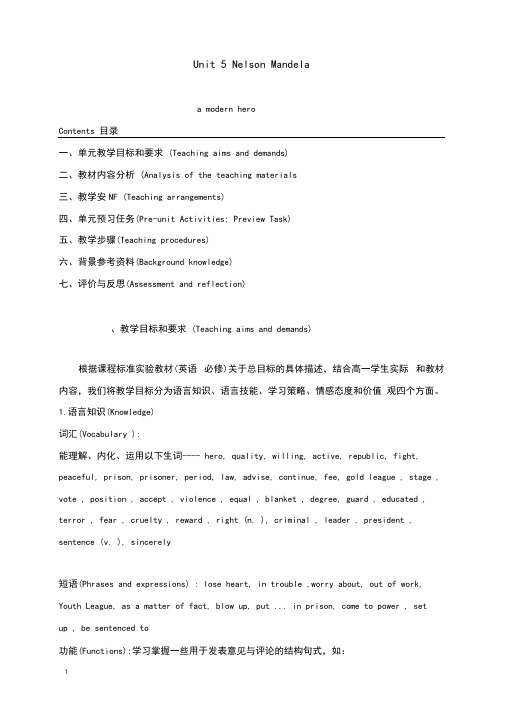
Unit 5 Nelson Mandelaa modern heroContents 目录一、单元教学目标和要求(Teaching aims and demands)二、教材内容分析 (Analysis of the teaching materials三、教学安NF (Teaching arrangements)四、单元预习任务(Pre-unit Activities: Preview Task)五、教学步骤(Teaching procedures)六、背景参考资料(Background knowledge)七、评价与反思(Assessment and reflection)、教学目标和要求(Teaching aims and demands)根据课程标准实验教材(英语必修)关于总目标的具体描述,结合高一学生实际和教材内容,我们将教学目标分为语言知识、语言技能、学习策略、情感态度和价值观四个方面。
1.语言知识(Knowledge)词汇(Vocabulary ):能理解、内化、运用以下生词---- hero, quality, willing, active, republic, fight, peaceful, prison, prisoner, period, law, advise, continue, fee, gold league , stage , vote , position , accept , violence , equal , blanket , degree, guard , educated , terror , fear , cruelty , reward , right (n. ), criminal , leader , president , sentence (v. ), sincerely短语(Phrases and expressions) : lose heart, in trouble ,worry about, out of work, Youth League, as a matter of fact, blow up, put ... in prison, come to power , setup , be sentenced to功能(Functions):学习掌握一些用于发表意见与评论的结构句式,如:1. 发表意见(Giving opinions )Why do you think so? What do you think of …? What's you opinion?agree / don't agree. I think / don't think .... I prefer .... In myopinion ....I'm afraid ....2.评论(Making comments)Good idea! That's an excellent idea .语法(Grammar):定语从句(II )(由where, when, why, 介词+ which, 介词+ whom引导的定语从句)The school where I studied only two years was three kilometres awayThis was a time when you had got to have a passbook to live in JohannesburgThe reason why I got a job was because of my hard work .•••we were put in a position in which we had either to accept we were less important, or fight the Government .The person to whomyou should be grateful for a peaceful South Africa is Nelson Mandela.扩展词汇:negative(消极的),heroine(女主角,女主人公),unwilling(不情愿的),nation(国家,民族),sacrifice(牺牲),realize (认识到),give up (放弃),riches (财富),Bible (圣经),revolution (革命),career (职业),equality (平等),fairness(公平),conflict (冲突),biography (自传),beliefs (信仰),Christianity (基督教),religion (宗教),priests (牧师),version (翻译),readable (易读的),adventure (冒险),scholar (学者),sympathy (同情),,campaign (从事活动),communist (共产主义者),injustice (不公平),oppose (反对),pilot(飞行员) , boycott (联合抵制)2.语言技能(Skills)听:在本单元的课文及练习册听力教学中,能听懂人物和事件以及它们的关系,能抓住所听语段中的关键词,正确理解话语间的逻辑关系。
高中英语 阅读课教学教案设计 新人教版必修5
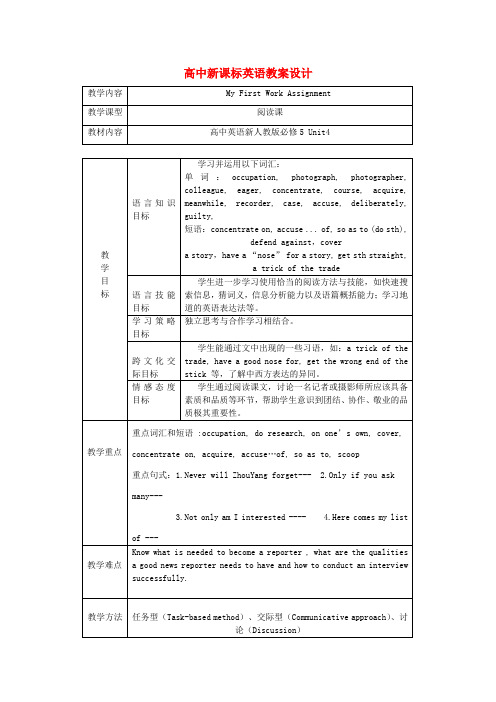
教师活动
学生活动
设计意图
Teaching Procedure
Step I: Lead-in & Warming up
(5m)
1. A free talk about students’ future plans and their ideal occupations.
Tip: Whatever you want to be, you need to know a lot about the occupations and prepare yourselves for them from now on.
Q7 Has the boss ever had a case where someone accused the journalist of getting the wrong end of the stick?
How to deal with accusations of printing lies?
①语言知识目标
学习并运用以下词汇:
单词:occupation, photograph, photographer, colleague, eager, concentrate, course, acquire, meanwhile, recorder, case, accuse, deliberately, guilty,
短语:concentrate on, accuse ... of, so as to (do sth), defend against,cover
a story,have a“nose”for a story, get sth straight, a trick of the trade
2019-2020学年高中英语unit2 the united kingdom sectionⅢgrammar教学案版本:人教版必修5
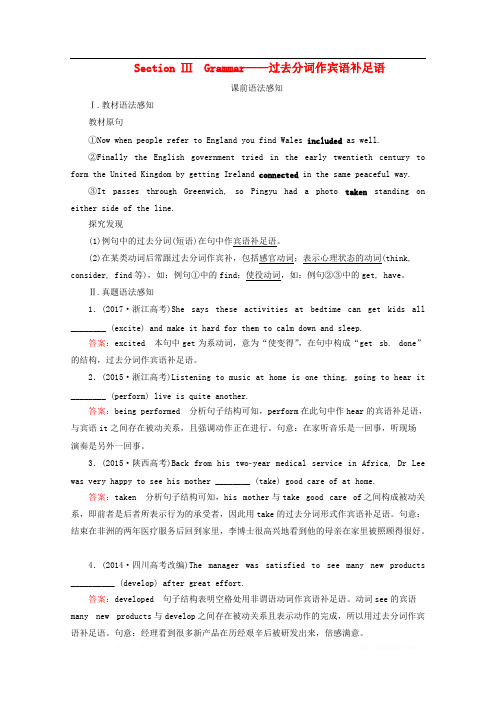
Section Ⅲ Grammar——过去分词作宾语补足语课前语法感知Ⅰ.教材语法感知教材原句①Now when people refer to England you find Wales included as well.②Finally the English government tried in the early twentieth century to form the United Kingdom by getting Ireland connected in the same peaceful way.③It passes through Greenwich, so Pingyu had a photo taken standing on either side of the line.探究发现(1)例句中的过去分词(短语)在句中作宾语补足语。
(2)在某类动词后常跟过去分词作宾补,包括感官动词;表示心理状态的动词(think, consider, find等),如:例句①中的find;使役动词,如:例句②③中的get, have。
Ⅱ.真题语法感知1.(2017·浙江高考)She says these activities at bedtime can get kids all ________ (excite) and make it hard for them to calm down and sleep.答案:excited 本句中get为系动词,意为“使变得”,在句中构成“get sb. done”的结构,过去分词作宾语补足语。
2.(2015·浙江高考)Listening to music at home is one thing, going to hear it ________ (perform) live is quite another.答案:being performed 分析句子结构可知,perform在此句中作hear的宾语补足语,与宾语it之间存在被动关系,且强调动作正在进行。
人教版高中英语必修五教案:Unit 4 Making the news
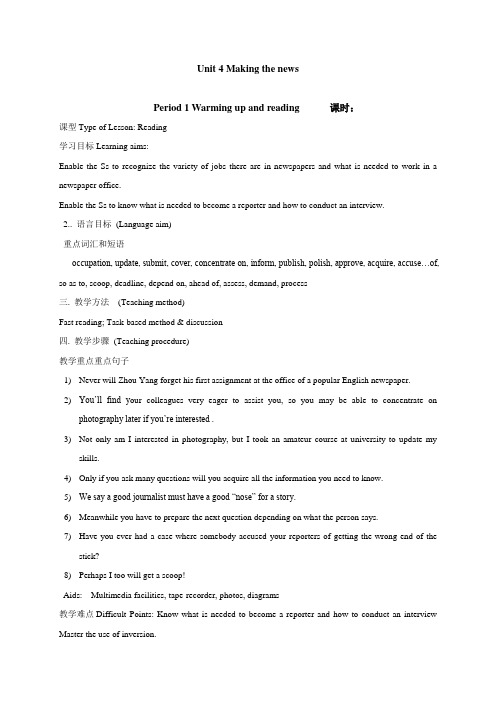
Unit 4 Making the newsPeriod 1 Warming up and reading 课时:课型Type of Lesson: Reading学习目标Learning aims:Enable the Ss to recognize the variety of jobs there are in newspapers and what is needed to work in a newspaper office.Enable the Ss to know what is needed to become a reporter and how to conduct an interview.2.. 语言目标(Language aim)重点词汇和短语occupation, update, submit, cover, concentrate on, inform, publish, polish, approve, acquire, accuse…of, so as to, scoop, deadline, depend on, ahead of, assess, demand, process三. 教学方法(Teaching method)Fast reading; Task-based method & discussion四. 教学步骤(Teaching procedure)教学重点重点句子1)Never will Zhou Yang forget his first assignment at the office of a popular English newspaper.2)You’ll find y our colleagues very eager to assist you, so you may be able to concentrate onphotography later if you’re interested .3)Not only am I interested in photography, but I took an amateur course at university to update myskills.4)Only if you ask many questions will you acquire all the information you need to know.5)We say a good journalist must have a good “nose” for a story.6)Meanwhile you have to prepare the next question depending on what the person says.7)Have you ever had a case where somebody accused your reporters of getting the wrong end of thestick?8)Perhaps I too will get a scoop!Aids: Multimedia facilities, tape-recorder, photos, diagrams教学难点Difficult Points: Know what is needed to become a reporter and how to conduct an interview Master the use of inversion.教学反思Teaching Re-thinking:家庭作业Homework:教学过程Teaching Procedures:一. 教学目标(Teaching aims)1. 能力目标(Ability aim)Period 1Step I Warming up. ( see page 25 )Can you tell some jobs in a newspaper company? What are their jobs involves?Teaching suggestions: rearrange the order of the types of jobs a newspaper has and what they involve And ask the students to do the matches. Then ask them to copy what’s on the screen to their books. At the same time deal with the new words:occupation and journalist and the expression: suppose you were…occupation =a job or professionTeaching is my occupation. 教书是我的职业.。
高中英语《必修五第一单元单元词汇课》优质课教案、教学设计

教案设计(Learning about Language)部分由“词汇学习”和“语法学习”两项内容组成。
“词汇学习” 部分练习1 通过词的后缀训练名词与形容词之间的相互转换提倡学生使用词典。
练习2 选词填空练习,利用语篇集中训练本单元的一些重点词汇的用法。
练习3 是单句填空,而且所选的十个句子或是引文或是谚语。
“语法学习”部分主要是帮助学生了解、熟悉并掌握情态动词的用法,共有三项练习。
“语言运用”(Using Language)部分主要是让学生运用本单元所学的语言知识与课文内容进行听、说、读、写等的综合训练。
“听与说” (Listening and speaking); 是听前准备活动。
“读与写”(Reading and writing)主要设计是:阅读内容主要讲述一位来自高中的学生对全球变暖十分关注并向地球保护协会写了一封信询问措施。
协会给出了相当令人满意的回信。
短文后的三个问题帮助学生理解文章的内容。
写信的部分主要是要求学生根据上面阅读文章的内容通过思考写出自己的思想、自己的做法,尝试解决问题的不同途径。
教材提供给学生一些写作时要思考的问题,帮助学生完成写作构思。
“小结”(S ummin g U p)部分让学生根据所给出的提示对所学各项内容进行总结。
“学习建议”(L e a r nin g T ip)部分主要建议学生看阅读报纸,多读书多总结,以培养学生运用语言资源的能力。
五、教学重点Teaching important pointsa.The usage of language points of this unit.b.To learn to use these words.教学难点Teaching difficult pointsa.Enable students to get the hang of the language points completely.b.Get students to discuss warmly and express their own and excellent idea.教学方法Teaching methodsa.Brainstormingb.Task based language teaching.c.Individual, pair or group work to finish each task.d.Discussion.教学过程:1.concludevi.推断出vt.结束①conclude 推断出;断定conclude...with... 以...结束conclusion n .结论;结束arrive at/come to/reach/draw a conclusion 得出结论in conclusion 总而言之学生去说;学生能做的教师就不要代替学生去做;学生回答问题无论对还是错,教师不要急于评判,让学生自已去评判与总结;对发言积极的学生要及时鼓励,决不能因为他们的答案与教师的标准答案不一样就否定并伤害学生的自尊心。
2020_2021学年高中英语Unit5FirstaidSectionⅢGrammar教师用书教案新人教版必修5

Unit 5 First aid省略语境自主领悟先观察原句后自主感悟1.These burns are not serious and (they) should feel better within a day or two (days).2.If burns are on arms or legs,keep them higher than the heart,if (it is) possible.3.It shows that a knowledge of first aid can make a real difference.4.First degree burns turn white when (they are) pressed. 1.例句1为并列句,因为两个分句的主语都是These burns,故第二个分句的主语省略;介词within后的宾语中因前面有名词day,故or后的同一名词days省略。
2.例句2中的条件状语从句中含有it is,可以省略。
3.例句3中的及物动词show后接宾语从句,连接词that一般可以省略。
4.例句4中的时间状语从句的主语和主句的主语First degree burns一致,且状语从句中含有be动词时,省略状语从句中的主语和be动词。
为了避免重复,将句子中的一个或几个成分省去,这种语法现象叫省略。
省略是避免重复、突出新信息并使上下文紧密连接的一种语法手段。
英语中的省略有下列几种情况。
一、简单句的省略1.祈使句的省略。
在祈使句中,通常省略主语you。
(You) Go down this street and turn right at the second crossing.请(你)沿着这条街走,然后在第二个十字路口向右拐。
2.There be 句型的省略。
(Is there)Anything else?(还有)其他东西吗?3.疑问句的答语省略。
—Are you from America?—Yes,I am (from America).——你来自美国吗?——是的,我是(来自美国)。
高中英语unit5first aid 教案人教版必修五
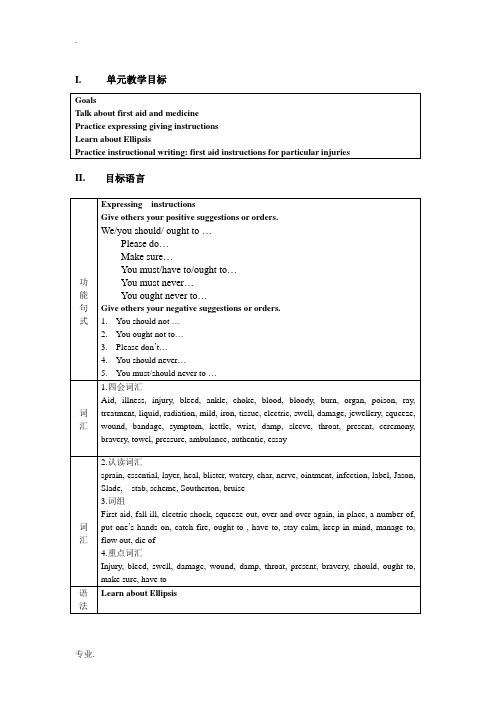
I. 单元教学目标II.目标语言课程设计与课时分配Period 1: Warming upPeriod2: ReadingPeriod 3-4: Language pointsPeriod 5-6: Language study & Grammarperiod 7-8: Using languageperiod 9: Listening and speakingPeriod 10: Extensive reading and WritingPeriod I Warming-u pTeaching goals:a.Encourage the students to discuss accidents and first aid .b.Enable the students to talk about different accidents and how to give first aid in differentsituations.c. Enable the students to be brave and calm when meeting with accident and know how togive first aid in different situations through discussion.Teaching important and difficult points:Help the students to use the expressions to describe the accidents and how to give first aid.a. Key words and expressions:aid, first, aid; fall ill; illness; injury; bleed; sprain; ankle; choke; blood; bloody; burn;essential; organ; layer; poison; ray; treatment;b. Communicating expressions:We/you should/ ought to …Please do…Make sure…You must/have to/ought to…You must never…You ought never to…Teaching aids:A recorder, a projector, and a computerTeaching methods:Brainstorm and discussion (Group work).Teaching procedures and waysStep I Lead-in1.Lead-in question: Watch a video, and fill in the blanks: what is first aid?First aid is the first kind of help given to someone who suddenly falls ill or gets injured before a doctor can be found.2. Warming-up: Brainstorming: What words can you think of when you talk about accidents and first aid?Step II DiscussionTalk about different situations and the way they should give first aid.Qs: What happened in each picture? What kind of first aid should you give?A snake bite: The person bitten must get to a doctor or hospital at once;Speed is very important.It will help the doctor greatly if you can tell him what kind of snake it was, ordescribe.Bleeding: Try to stop the bleeding;Press a handkerchief onto the bleeding point and hold it there;Hold up the part of body which is bleeding if possible.(watch the video about how to deal with bleeding )A sprained ankle: Tied with medical bandage.It is better to avoid walking with the injured ankle.It is correct to use ice bag for removing pain and bleeding, and also not influence ourown body healing.( a video about a sprained ankle)Choking : Make him /her spit by patting him/her on the back.To avoid this, we shouldn’t talk or laugh when eating.〔a video about unconscious choking〕A broken arm: Do not move the patient.Send for an ambulance at once.Treat for shock if necessary.A bloody nose: Stay calm.Breathe through the mouth, not the nose.Sit up and bend the head slightly forward.Pinch捏both nostrils鼻孔shut using a thumb and forefinger.Spit out any blood that collects in the mouth.Step III Further discussion (Individual)Ask the students to give the situations.(some more situations are given and encourage the students to talk more)Drowning :Check to see if he /she is breathingTry to start his /her breathingNever swim in deep water.( a video about CPR)Traffic accident: Call for a doctor or an ambulance.Never pull her out of the carFind enough people to lift the car safely and take her to hospital at once.Look at both sides when crossing the street.Step 4 Quiz for first aid (on p74)1.Which person would you help first?___A Li Yan who has cut her foot on glassB Xue Jin whose nose is bleedingC GaoY uan who is on the ground not breathingD Wang Feng who has broken her arm.2. When carrying out rescue breathing, how many times a minute should you blow air into the victim’s mouth? ______.A 4B 8C 15D 203. What should the first step be when you carry out rescue breathing?____A Clear the airwayB check the pulseC blow into the victim’s mouthD check for breathing4 How would you stop severe bleeding? ___A cover the wound with plasticB wash the woundC do nothing as the bleeding will stop by itselfD put a bandage over the wound and then press on it5 A friend is choking on a piece of food and is coughing badly. What should you do?___A nothingB carry out rescue breathingC have her lie down and restD slap her four or five times on her backStep 5 HomeworkPrepare for the reading partAfterthoughts:_____________________________________________________________________ _____________________________________________________________________ _____________________________________________________________________ ______________________________________________________________Period 2 ReadingTeaching goals:a.Enable the students to master some English expressions and phrases and to know someknowledge of first aid.b.Enable the students to learn how to give their correct suggestions about first aid when othersare in danger,Teaching important points:Let Ss learn to use the structures of giving suggestionsa. Key words and expressions:burn, essential, organ, layer, poison, ray, treatment, liquid, radiation, mild, iron, heal, tissue, electric, swell, swollen, blister, watery, char, nerve, damage, jewellery, squeez out, over and over again, bandage, in place.b. Useful sentences:Burns are called first degree, second degree or third degree burns,These burns are not serious and should feel better within a day or twoFirst degree burns turn white when pressed.Teaching methods:Skimming method., Task-based method, Role-play methodTeaching aids:A projector, a tape-recorder and a blackboardTeaching procedures and ways:Step 1 Pre-readingFirst let the students talk about the picture (page 33)What kind of first aid would you perform in the situation of burning?Step 2 While-reading1)Skim for general idea.How many parts are the text and what are they?(After a few minutes)Five parts1.The purpose of skin2.Causes of burns3.Types of burns4.Symptoms of burns5.First aid treatment2) ScanningDetailed reading: Filling in the blanksWhat can skin do for our body ?•Protect you against diseases, poisons and the sun’s harmful rays.•Keep you warm or cool•Prevent you from losing water•Gives you sense of touchCauses of burnsYou can get burnt by :•hot liquids,•steam,•fire,•radiation,•th e sun,•electricity and chemicalsWhat are the three types of burns?•F i r s t d e g r e e:Not serious; affect only the top layer of the skin; feel better a day or twoS e c o n d d e g r e eAffect both the top and the second layer of the skin; serious; take a few weeks to healT h i r d d e g r e eAffect all three layers of the skin and any tissue and organs under the skin; very severe injuries; victim must get to a hospital at once.Label the pictures with three degree burnsT h e s e c o n d d e g r e e b u r n T h e f i r s t d e g r e e b u r n T h e t h i r d d e g r e e b u r n 3) Read the last part and answer the questions:1. Why should you put cold water on a burn?T h e c o l d w a t e r s t o p s t h e b u r n i n g p r o c e s s,s t o p s t h e p a i n a n d p r e v e n t s o r r e d u c e s s w e l l i n g.2. Why doesn’t a third degree burn hurt?B e c a u s e n e r v e s i s d a m a g e d.3. Why do you think clothes and jewellery near burns should be removed?B e c a u s e t h i s m a y b r e a k a n y b l i s t e r s a n d t h e w o u n d m a y g e t i n f e c t e d.4. If someone has a third degree burn, why might you see tissue?T h e s e a f f e c t a l l t h r e e l a y e r s o f t h e s k i n a n d a n y t i s s u e a n d o r g a n s u n d e r f i r e sStep 3 HomeworkRead the text over and again and underline the difficult pointsAfterthoughts:_____________________________________________________________________ _____________________________________________________________________ _____________________________________________________________________ _____________________________________________________________Period 3-4 Language PointsTeaching goals:Enable the students to master some English expressions and phrases and to know some knowledge of first aid.Teaching important points:Learn useful expressions and sentence structuresTeaching methods:Guiding and explainingTeaching procedures:Step I Language points1. fall + adj.睡着了fall asleep清醒了fall awake安静下来fall silentHis wife suddenly fell ill last week. 他妻子突然生病了。
2021-2022学年高中英语人教版必修五教学案:Unit 1 Section Ⅳ Word版含答案

SectionⅣLearningaboutLanguage&UsingLanguage对应同学用书P15[原文呈现]COPERNICUS' REVOLUTIONARY①THEORYNicolaus Copernicus②was frightened and his mind was confused③. Although he had tried to ignore them, all his mathematical calculations led to④the same conclusion that the earth was not the centre of the solar system⑤. Only if you put the sun there did⑥the movements⑦of the other planets in the sky make sense⑧. Y et he could not tell anyone about his theory as the powerful Christian Church⑨would have punished him for even suggesting such an idea. They believed God had made the world and for that reason⑩the earth was special and must be the centre of the solar system.[读文清障]①revolutionary [ˌrevə'luːʃənərI]adj.革命的;重大变革的②Nicolaus Copernicus ['nIkələs kəʊ'pɜːnIkəs]尼古拉·哥白尼(波兰天文学家)③confused adj.困惑的;苦恼的④lead to通向;导致⑤the solar system太阳系⑥only后接if引导的状语从句,主句使用部分倒装。
人教版高中英语必修4《Unit5Themeparks》教案

人教版高中英语必修4《Unit5Themeparks》教案教学准备教学目标(1)阅读文章后,大部分学生能够归纳出三大主题公园的主题并列出园内的主要活动。
(2)阅读文章后,学生能够匹配图片与相应的主题公园,并恰当使用课文中的关键词汇和句型陈述理由。
(3)通过拓展阅读与小组合作,学生能够制定出一个简单的主题公园一日游计划(4)通过本节课的学习,学生能够有较强的自信心自如陈述自己的观点。
教学重难点(1)阅读文章后,大部分学生能够归纳出三大主题公园的主题并列出园内的主要活动。
(2)阅读文章后,学生能够匹配图片与相应的主题公园,并恰当使用课文中的关键词汇和句型陈述理由。
(3)通过拓展阅读与小组合作,学生能够制定出一个简单的主题公园一日游计划(4)通过本节课的学习,学生能够有较强的自信心自如陈述自己的观点。
教学过程Step1Warming-upandlead-in(5mins)(1)导入教师提问学生“Haveyoubeentoathemepark?”与“Whatcanyoudoinathemepark?”,以此导入到本课的课题。
然后通过图片介绍主题公园内常见的游乐设施,为文本阅读做好铺垫。
T:Hello,class.Todaywearegoingtotalkaboutthemeparks.First ,Iwouldliketoaskyou:①IsourWestLakeParkathemepark?WhataboutJingqiWaterPark?②Haveyoubeentoathemepark?③Whatcanyoudoinathemepark?S1:Westlakeisnotathemepark.JingqiWaterParkisathemepark.S2:IhavebeentoHongkongDisneyland.Inathemeparkwecandoalot ofactivities.T:Exactly,inthethemeparkwecantakeroller-coaster,free-falldrop,swingingship,Ferriswheel,merry-go-roundandsoon.Inaword,therearevariousrideswecantakeinathemep ark.Well,whatdoes“ride”mean?S3:游乐设施T:Yes.Hereitisanoun,meaning“供乘骑的游乐设施”.(2)揭题教师引导学生对课文题目进行预测。
高中英语人教版必修5教案-Warming_up、Pre-reading
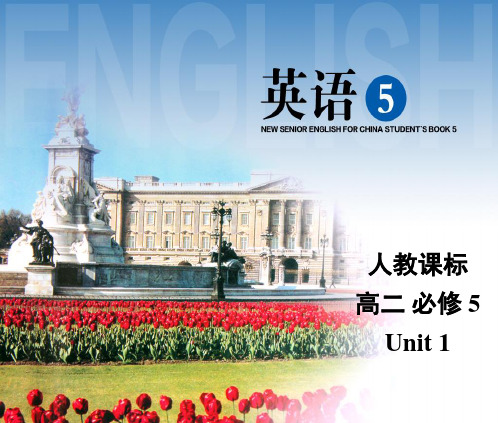
He is … Leonardo da Vinci
Who is he?
Who invented a lamp to keep miners safe underground?
eavwidaeynbceut ddrieadnkoftchheowlearatearftaelrso8.
_d_r_i_n_k_in_g__t_h_e__w_a_t_e_r___
died.
_. Polluted water
Draw a ◆ 9. _______________
conclusio carried the virus.
Germany
3. Look at the picture, the map and the title and predict the content of the reading passage. Then skim it quickly to see if you are right.
John Snow
Public house
Many deaths happened here.
No death happened here.
The water from the pump was to blame.
The water was from the river which had been polluted by the dirty water from London.
Small, white, flocculent particles
Stage 6
2021-2022学年高中英语人教版必修五教学案:Unit 5 Section Ⅱ Word版含答案

Section ⅡWarming Up & Reading — Language Points一、这样记单词记得准·写得对记得快·记得多Ⅰ.基础词汇1.temporary adj.临时的;临时的2.choke v i.&v t. (使)噎住;(使)窒息an n. 器官4.barrier n. 屏障;障碍(物)plex adj. 简单的6.liquid n. 液体7.scissors n.(pl.) 剪刀8.squeeze v t.&v i. 榨;挤;压榨9.vital adj. 至关重要的;生死攸关的10.symptom n. 症状;征兆11.pour v t.&v i. 倒;灌;注;涌12.damp adj. 潮湿的1.temporary adj.临时的;临时的[反义]permanent adj.永久的[联想]contemporary adj.当代的;同时代的an n.器官[联想]器官及身体部位相关词汇合锦①lung n.肺②liver n.肝③skin n.皮;皮肤④ankle n.踝(关节)⑤wrist n.手腕⑥tissue n.(生物)组织3.liquid n.液体[联想]物质的各种存在形式①solid n.固体adj.牢固的;固体的②steam n.蒸汽;水蒸气③gas n.煤气;气体4.scissors n.(pl.)剪刀[规律]一些成双成对的名词通常只有复数形式,常见的还有:①jeans牛仔裤②headphones耳机③trousers裤子④glasses眼镜⑤shoes鞋子⑥compasses圆规Ⅱ.拓展词汇1.bleed v i.&v t.流血→blood n.血;血液2.injury n.损伤;损害→injure v t.使受伤;弄伤→injured adj.受伤的3.poison n.毒药;毒害v t.毒害;使中毒→poisonous adj.有毒的d adj.稍微的;温存的;温存的→mildly ad v.稍微地;温存地5.swell v i.&v t.(使)膨胀;隆起→swollen adj.肿胀的6.unbearable adj.难以忍受的;不能容忍的→bearable adj.可忍受的;能应付的→bear v.忍受7.variety n.变化;多样(化);多变(性)→vary v i.变化;变动→various adj.各种各样的5.vital adj.至关重要的;生死攸关的[同义]important; of great importance6.aid n.&v t.挂念;救济;资助[联想]“挂念”家族①help n.&v t.挂念②assist v t.挂念;帮忙③support n.&v t.支持;挂念④sponsor v t.赞助⑤fund v t.资助⑥do sb. a favour挂念某人⑦give/lend sb. a hand挂念某人7.与“急救”有关的词汇①poison n.&v t.毒药;使中毒②injury n.损伤;损害③choke v i.&v t.(使)噎住;(使)窒息④bleed v i.&v t.流血⑤treat v t.&v i.治疗⑥cure v t.治愈⑦apply v t.涂;敷⑧first aid急救二、这样记短语记坚固定短语多积常用词块1.first_aid(对伤患者的)急救2.fall_ill 生病3.get_injured 受伤4.a_variety_of 各种各样的5.electric_shock 触电;电休克6.squeeze_out 榨出;挤出7.over_and_over_again 反复;多次8.in_place 在适当的位置;适当1.an essential part必不行少的部分2.a barrier against ... 抵挡……的一道屏障3.a sense of touch 触觉4.within a day or two 一两天内5.tissue and organs under the skin皮下组织和器官6.take off 脱掉7.icy water 冰水8.get infected 感染三、这样记句式先背熟再悟通后仿用1.... it is where you feel cold, heat or pain and it gives you your sense of touch.……正是皮肤使你感到冷、热或苦痛,它还使你有触觉。
2021高中英语-必修5Unit4Makingthenews导学案-教师版
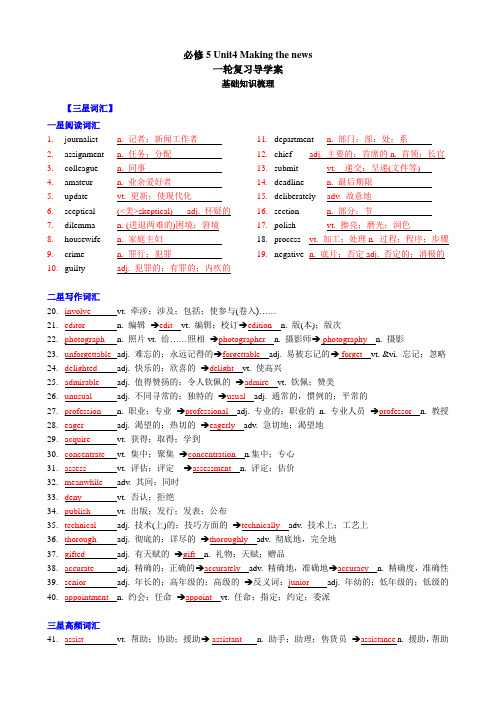
必修5 Unit4 Making the news一轮复习导学案基础知识梳理【三星词汇】一星阅读词汇1.journalist n. 记者;新闻工作者2.assignment n. 任务;分配3.colleague n. 同事4.amateur n. 业余爱好者5.update vt. 更新;使现代化6.sceptical (<美>skeptical) adj. 怀疑的7.dilemma n. (进退两难的)困境;窘境8.housewife n. 家庭主妇9.crime n. 罪行;犯罪10.guilty adj. 犯罪的;有罪的;内疚的11.department n. 部门;部;处;系12.chief adj. 主要的;首席的n. 首领;长官13.submit vt. 递交;呈递(文件等)14.deadline n. 最后期限15.deliberately adv. 故意地16.section n. 部分;节17.polish vt. 擦亮;磨光;润色18.process vt. 加工;处理n. 过程;程序;步骤19.negative n. 底片;否定adj. 否定的;消极的二星写作词汇20.involve vt. 牵涉;涉及;包括;使参与(卷入)……21.editor n. 编辑→edit vt. 编辑;校订→edition n. 版(本);版次22.photograph n. 照片vt. 给……照相→photographer n. 摄影师→ photography n. 摄影23.unforgettable adj. 难忘的;永远记得的→forgettable adj. 易被忘记的→ forget vt. &vi. 忘记;忽略24.delighted adj. 快乐的;欣喜的→delight vt. 使高兴25.admirable adj. 值得赞扬的;令人钦佩的→admire vt. 钦佩;赞美26.unusual adj. 不同寻常的;独特的→usual adj. 通常的,惯例的;平常的27.profession n. 职业;专业→professional adj. 专业的;职业的n. 专业人员→professor n. 教授28.eager adj. 渴望的;热切的→eagerly adv. 急切地;渴望地29.acquire vt. 获得;取得;学到30.concentrate vt. 集中;聚集→concentration n.集中;专心31.assess vt. 评估;评定→assessment n. 评定;估价32.meanwhile adv. 其间;同时33.deny vt. 否认;拒绝34.publish vt. 出版;发行;发表;公布35.technical adj. 技术(上)的;技巧方面的→technically adv. 技术上;工艺上36.thorough adj. 彻底的;详尽的→thoroughly adv. 彻底地,完全地37.gifted adj. 有天赋的→gift n. 礼物;天赋;赠品38.accurate adj. 精确的;正确的→accurately adv. 精确地,准确地→accuracy n. 精确度,准确性39.senior adj. 年长的;高年级的;高级的→反义词:junior adj. 年幼的;低年级的;低级的40.appointment n. 约会;任命→appoint vt. 任命;指定;约定;委派三星高频词汇41.assist vt. 帮助;协助;援助→assistant n. 助手;助理;售货员→assistance n. 援助,帮助rm vt. 告知;通知→information n. 信息,资料43.case n. 情况;病例;案例44.accuse vt. 指责;谴责;控告→accusation n. 指责;谴责;控告45.demand n. 需求;要求vt. 强烈要求→demanding adj. 要求很高的;费力的46.approve vt. 赞成;认可;批准→approval n. 批准;认可;赞成【短语巧记】1.concentrate on 集中;全神贯注于2.accuse sb of 因……指责或控告某人3.depend on 依靠;依赖4.so as to (do sth) 为了(做)……5.ahead of 在……前面6.approve of 支持;赞成7.be absorbed in 专注于;全神贯注于8.make an appointment with 和……约会9.keep sth in mind 牢记某事rm sb of sth 通知/告知某人某事11.be supposed to 应当12.have a good nose for对……很敏感13.in a dilemma 进退两难14.be eager to do/for 渴望做/渴望得到15.be senior to 比……年长;比……级别高【联想法巧记词语】1.“v.+sb+of+sth”结构大集合①inform sb of sth 告知某人某事②warn sb of sth 警告某人某事③cure sb of sth 治好某人某病④remind sb of sth 提醒某人某事⑤accuse sb of sth 指控某人某事⑥rob sb of sth 抢劫某人某物⑦convince sb of sth 使某人相信某事⑧suspect sb of sth 怀疑某人某事2. 表示“态度”的形容词一览表①支持:supportive; favourable; approving②反对:opposed; disapproving; contradictory③怀疑:doubtful; sceptical; skeptical④主观:subjective; 客观:objective⑤积极:positive; 消极:negative⑥批评:critical⑦中立:neutral⑧同情:sympathetic【语法速递】1.Never will Zhou Yang (ZY) forget his first assignment at the office of a popular English newspaper.2.Only if you ask many different questions will you acquire all the information you need to know.3.It was a dilemma because the footballer could have demanded damages if we were wrong.4.Then as the article was going to be written in English Zhou Yang also took a copy to the native speakeremployed by the newspaper to polish (polish) the style.5.He denied taking/having taken (take) money but we were sceptical.6.Meanwhile you have to prepare the next question depending (depend) on what the person says.7.You’l l have a professional (profession) photographer with you to take photographs.8.Zhou Yang waited excitedly (excited) for the first copies to be ready.【典句仿写】1. 否定副词位于句首倒装【课文原句】Never will Zhou Yang (ZY) forget his first assignment at the office of a popular English newspaper. 周阳永远不会忘记他在一家畅销英文报社的第一项工作任务。
人教版高中英语必修一-Unit-5教案

Unit 5 Nelson Mandela——a modern hero教材分析:本单元以Nelson Mandela —— a modern hero为话题,目的在于使学生了解一个伟大的人应具备怎样的品质,学会表达自己的观点,并用所学的句型来描写一个伟人。
提示:1、本单元从warm-up开始,到最后的writing,都是以第三人称的角度来进行描述的,因此,教学中要注意这种人称的前后一致,否则无法前后一致的引导学生进行学习和表达。
2、Reading部分侧重于理解,以及理解基础上的summary,这为最后的writing做好的铺垫和积累(尤其是关键单词、句型和结构的积累),最后的writing要是前面阅读后的仿写(当然能力较强的学生也可以不受限制的开展写作)。
3、如何激发学生学习关于这些伟人的文章,是需要教师思考的:这些伟人学生会感兴趣吗?学生了解多少关于这几位伟人的伟大业绩?从哪些角度来导入会让学生更加的感兴趣?4、教学目标建议增加:通过学习文章和相关素材,进一步了解伟人的生平事迹,尤其是如何才能成为伟人。
培养学生初步使用相关词汇、句型和文章结构进行人物生平描述的口语表达和基础写作能力。
Teaching aims:1. To arouse Ss’ interest in learning about heroes in history2. To develop Ss’ listening and speaking ability.Teaching procedures:Step1 warming up●Describe yourselvesFirst what kind of person are you? (shy, outgoing, fun, mean, immature, nice, kind, honest, brave, loyal, happy, wise, smart, friendly, warm, cheerful, popular, generous, hard-working, diligent, weak, stupid, lazy, dishonest, tense, cold, unkind, miserable, dull, strong-minded, determined etc.)●Discussion (Encourage students to give five or six qualities that they think greatpersons have, and give their reasons.)提示:What kind of great persons? Politicians, scientists, or? Different kinds of great persons, different qualities.Question 1: Who do you think are the greatest men in your mind? Can you name some?Question 2: In what way do you consider a man is a great? What is your standard?●Look at page 33 and then ask the Ss if these famous people are great people.●Conclusion:A great person is a person who has followed his or her ideas and sacrificed(牺牲) something so that they could be realized. A pop singer may be very popular with the young people, but he/she is not a great man/woman.A famous person may be well-known but if he or she has not gone through struggles and difficulties for their noble aims, they can not be called a great person.Step2 language points:1.devote vtoneself to 献身于、致力于。
2019版人教统编高中英语必修第一册全册教案教学设计(Unit1-5)
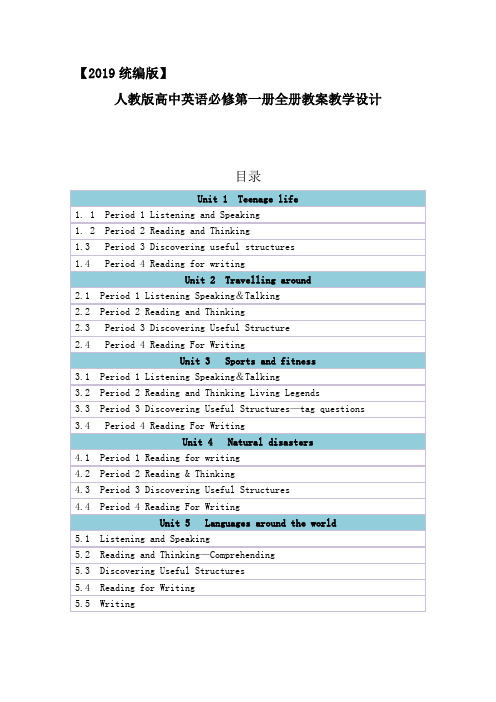
【2019统编版】人教版高中英语必修第一册全册教案教学设计目录1.1 Period 1 Listening and Speaking教学目标与核心素养:1. Let students master the useful words and expressions about school clubs and ways to express their hobbies or interests2. Let students briefly understand functions of different clubs and be aware of the ways of choose a suitable club.3. Get students to practice grasping topics and details while listening a dialogue.4. Get students to talk about topics relating to campus clubs.教学重难点:Importance:1. Get students to practice grasping topics and details while listening a dialogue.2. Get students to talk about topics relating to campus clubs.Difficulty:Guide the students to combine the topic with useful expressions about interests and preferences, and express themselves freely .课前准备:1.Ask the students to make preparations in vocabulary and phrases related to the theme of the period.2.Help the students to finish the Guided Learning Plan教学过程:Step 1Warming upActivity 1Ask Ss to match the photos with the names of the clubs. And hold a brief discussion about what the students are doing in the clubs.Step 2 Listening (1)Activity 2Guide the students to listen to the first two conversations and choose the correct answers.Remind the students to pay attention to the Predict Content:“Before you listen, you can read the questions and choices. It will help you topredict what you will hear.”1.What are they learning about in Conversation 1 ?(A)A. HearingB. SoundsC. Dogs.2.The students are discussing_____ in Conversation 2.(C)A. school workB. relationshipsC. dating.3.Circle the two clubs where these two conversations happened. (A)(D)A. Science ClubB. Ballet ClubC. Nature ClubD. Debate ClubActivity 3Guide the students to listen to conversation3. Then finish the following exercise.1. Tick the activities that happen in each club.Ballet Club Nature Club Cartoon Club Volunteer Clublearn new movements listen to lectures watch cartoons help old peoplewatch dance programs grow plants writes stories clean up parksmake Ballet clothes work in a greenhouse draw cartoons give directions.2. Adams says that he likes ___________but is not so interested in _________ .(B)A. stories, cartoonsB. animals, plantsC. making friends, cleaning up.3. Which club do you think is suitable for Adam? Why?I think Adam should join the Volunteer Club because he likes to do something outdoors.Step 3 SpeakingActivity 4Organize the students to working pairs and help each other choose a school club.Make some preparations before pair work.Brainstorm USEFUL WORDS and EXPRESSIONS FOR THE PAIR WOWRK. Are you going to join …?. I’d like to…, but I am not sure….. Which club do you like to join?. Have you decided which club to join?. My dream is to be……. …is not for me.. I like …,but I am not so interested in….…Provide an example for the students to modify.EXAMPLEA: Hi, Sam! I've decided to join the Music Club.B: Good decision!A: How about you? Are you going to join a club?B: Yes I'm wondering which one I should choose:the Act Club or the Ballet Club?A: I guess the question is… Do you like dancing better than acting?B: Actually, I like acting better, but my friends go to the Ballet Club and I want to be with them.A: Hmm…If you ask me,I think you should choose what you like.Step 5 PronunciationActivity 5Listen and repeat.Guide the students to listen and pay attention to the combinations of lettersEncourage the students to add more words to each groupProvide help whenever necessary.al talk, wall, ball,fall,call, all…ay pay, stay, delay, day, may, play, display, away…ai paint, daily, gain, pain, hailstone, wait…are care, declare, dare, prepare, spare, scare…ar bar, hard, car, star, large, enlarge…er her, prefer, teacher, farmer, paper …ir bird, circus, circle, ,third, thirsty, fir, birthday, shirt, dirty……or horse, absorb, bore, door, story…or word, work…ur burn, hurt, fur, turn, nurse, turtle, purple…ee keen, tree, fee, seem, feet, teeth…ea clean, eager, teach, leave, speak…ea head, ready, bread, weather, sweater, heavy…ear clear, appear, fear, hear, dear, near, ear, …ear earn, heard, search, learn, earn, earth…oa boat, coach, coat, goat, load, …ow show, grow, low, blow, slow, follow, eyebrow……ow now, shower, town, down, how, tower…ou out, loud, about, loud, doubt, mouth, house, mouse…ore more, bored, forecast, forehead, core…2. Guide the students to listen to the proverbs and repeat. Notice the pronunciation of the letters in bold.1. The early bird catches the worm.2. Always prepare for a rainy day.3. Actions speak louder than words.4. All work and no play makes Jack a dull boy.5. Distance tests a horse’s strength. Time reveals a person's character.Period 2 Reading and Thinking教学目标与核心素养:1. Let students master useful words and phrases related to the text;2. Let students understand the challenges Adam meets in his new schooland compare the similarities and differences of their school and Adam’s;3. Help the students finish vocabulary exercises in the text book.4. Get students to understand they should learn to face difficultiesand challenges in senior high school for their own future.教学重难点:Importance:Help the students to master key words and phrases in the text.Guide students to compare school life in different places.3. Guide the students to learn about Adam’s school life and understand that everyone should overcome difficulties in a new situation.Difficulty:Guide the students compare their school life and Adam’s, and discussways to deal with challenges.课前准备:1.Ask the students to prepare new words and phrases related to the contents of the text.2.Mark the new words in the textbook, understand the meaning in context, or consult the dictionary to understand the meaning.教学过程:Step 1 Preparationfreshman ___________ junior high school ___________ Senior high school___________confusing ___________ choose courses___________ signup___________extra-curricular activities___________ hand out ___________ homeless people___________in the community ___________ get used to doing___________ keep upwith ___________challenge _________ topic________ fluent _________ graduate ________recommend ___________ literature_________ obviously_________quit_________be responsible for _________ schedule_________ editor_________Step 2 Warming upCompare school life in different placesActivity 1Guide the students to take part in the group work and discuss schoollife in and out of China.Ask Ss to work in groups and discuss the questions.What do you want to know about the school life in other countries?Possible answers:I want to know whether they take extra courses during summer or winter vocations.I wonder if they have enough free time to develop their own interests.I am interested in what subjects they study at school.…What would you tell a teenager from another country about school lifein China?I am happy to come to my new school and know a lot of new friends.Our teachers are patient and helpful.I feel a little worried about my study because I have more subjectsto learn.…Activity 2Read the text quickly to find the main idea of each paragraph.Guide the students to read the text quickly and fill in the blanks in this part.Possible answers:Paragraph1:Senior high school is a Challenge.Paragraph2:It is important to choose courses.Paragraph3:Extra-curricular activities are also important.Paragraph4:A senior high student must work harder and be more responsible.Step3 Intensive readingActivity 3Read the text again and answer the questions.Guide the students to read the text carefully and find the answers to the following questions.What causes did Adams choose? Which one do you think would be his favorite? Why?What does “make the team” in paragraph mean?What is Adam worried about?Is Adam confident that he will get used to senior school life? How do you know?Possible answers:Adam chooses Math, English chemistry, world history and Chinese. I think. English advanced literature is his favorite because he likes English, and he is good at it.It means joining the football team.He is worried that he can’t keep up with other students in his advanced course and get used to all the homework.Yes, he is. On the one hand, Adam knows that he has to study harderas a senior school student to be well prepared for his future. On the other hand, Adam knows that school advisers and teacher can give him help when he is faced with problems.Activity 4Complete the outline. Then discuss the questions below with a partner.Get the students to work in pairs and fill in the blanks after discussing the questions carefully. Encourage the students to find clues from the text.Guide the students to discuss the following questions and encourage them to answer the questions according to Adam’s story and their own situation.What kind of person do you think Adam is? Why?Do you face the same challenges as Adams? What other challenges areyou facing?What are some differences between Adam’s school and your school life?Possible answers:Adam is clear-minded and responsible for himself. When he chooses courses, he knows his advantages。
高一人教版英语教案
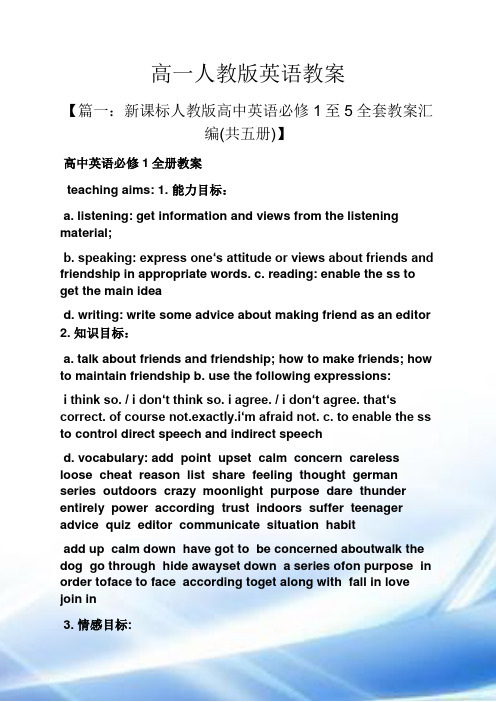
高一人教版英语教案【篇一:新课标人教版高中英语必修1至5全套教案汇编(共五册)】高中英语必修1全册教案teaching aims: 1. 能力目标:a. listening: get information and views from the listening material;b. speaking: express one‘s attitude or views about friends and friendship in appropriate words.c. reading: enable the ss to get the main idead. writing: write some advice about making friend as an editor2. 知识目标:a. talk about friends and friendship; how to make friends; how to maintain friendshipb. use the following expressions:i think so. / i don‘t think so. i agree. / i don‘t agree. that‘s correct. of course not.exactly.i‘m afraid not. c. to enable the ss to control direct speech and indirect speechd. vocabulary: add point upset calm concern careless loose cheat reason list share feeling thought german series outdoors crazy moonlight purpose dare thunder entirely power according trust indoors suffer teenager advice quiz editor communicate situation habitadd up calm down have got to be concerned aboutwalk the dog go through hide awayset down a series ofon purpose in order toface to face according toget along with fall in love join in3. 情感目标:a. to ar ose ss‘ interest in learning english;b. to encourage ss to be active in the activities and make ss to be confident;c. to develop the ability to cooperate with others. 4. 策略目标:a. to develop ss‘ cognitive strategy: taking notes while listening;b. to deve lop ss‘ communicative strategies.5. 文化目标:to enable the ss to get to know different opinions about making friends from different countries.teaching steps: period one step1. warm-up1. ss listen to an english song auld lang syne.2. brainstorming: let ss say some words about friendship –honest, friendly, brave, humorous, funny, wise, kind,open-minded, responsible, helpful…. step 2. talk about your old friends1. ss talk about their old friends in junior middle school, talk about their appearance, personality, hobbies,etc.2. self-introduction step3. make new friendsstep 4. do a surveyss do the survey in the text ,p1 sep 5. listening and talkingdo wb p41 (talking). while ss listen to the material, ask them to take notes about the speaker‘s views of making friends.when ss make their conversation, ask them to try to use the following expressions. i think so. / i don‘t think so. i agree. / i don‘t agree.that‘s correct.of course not.exactly. i‘m afraid not. step 6. discussiondivide ss four in one group and each group choose a topic to discuss. there are four topics. topic 1: why do you need friends? make a list of reasons why friends are important to you.topic 2: there is a saying ―to have a good friend, you need to be a good friend.‖ what do you think of the saying and howcan you be a good friend?topic 3: does a friend always have to be a person? what else can be your friend? why? topic 4: list some qualities of a person who does not make friend easily. step 7. summary1. ask ss themselves to summarize what is friendship andwhat is the most important in making friends. 2. t shows more information about friendship and a poem about friendship.what is friendship?3. tell ss: make new friends and keep the old; one is silver and the other is gold. step 8. evaluationhomework:1. look up the new words and expressions in warm-up andpre-reading in a dictionary. 2. write a short passage about your best friend.period two readingstep1.warming upactivity1: suppose you have to stay indoors to hide yourselffor a whole year. you can never go outdoors, otherwise youwill be killed. you have no telephone, computer, or tv at home. how would you feel? what would you do?four students a group discuss with each other for 2 minutes. activity2: play a short part of the moviesstep2. predictingstudents read the title of the passage and observe the pictures and the outline of it to guess: who is anne’s best fr iend?what will happen in the passage?step3. skimmingstudents skim the passage in 2 minutes to get the main idea : who is anne’s best friend? when did the story happen?step4. scanningstudents work in pairs to find the information required below:annestep5. intensive readingstudents work in group of four to discuss the following open questions:1.why did the windows stay closed?2.how did annefeel?3.what do you think of anne?4.guess the meanings of ―spellbound‖, ― hold me entirely in their power‖ from the discourse(语篇,上下文).5.which sentences attract you in the passage?step6. activityfour students a group to discuss the situation:suppose you four have to hide yourselves for 3 months. during the three months, you will be offered the basic food, water and clothes. your group can take 5 things with you.what will you take? why? how will you spend the 3months?how will you treat each other and make friends ?step7.assignmenttask1.surf the internet to find anne’s diary and read some of it. print out a piece of the diary and write down your feelings afterreading it on the page. we will share the pieces and your feelings with the whole class.task2.ex2.3on page3period threestep 1. warming upcheck the ss‘ assignment: task 2step 2. language points:step 3. learning about language1. finish ex.1, 2 and 3. on page 4.2. direct speech and indirect speech: ss do ex.1 and 2 on page 5. then let the ss themselves discover thestructures.step 4. practice using structures on page 42: ask the ss to use indirect speech to retell the story. step 5. assignmentfinish wb. ex, 1 and2 on page 41 and 42.period fourstep 1. revision check the ss‘ assignment. step 2. rea ding ss read the letter on page 6 notes:1. get along with2. fall in love step3. listeningss should take notes while they are listning.1. first listening: ss listen and answer the questions of part 2 on page 6.2. second listening: ss listen again and finish part 3 on page 6. step 4. listeningss listen to a story about anne and try to finish wb. ex 1 and 2 on page 43 and page 44. step 5. speakingss work in groups of four. design a questionnaire to find out what kind of friends your classmates are. they can use the quiz in the warming up to help them. step 6. assignment1. ss prepare the reading task on page 44.2. surf the internet and find some material about friendship in different countries.period fivestep 1. warming up ss say something about making friends and how to maintain friendship. step 2. listening ss listen to a short passage and fill in the blanks on page 41 (listening). step 3. reading1. first reading: ss read the passage about friendship in hawaii and finish wb.ex1.on page 45.2. second reading: ss read again and discuss the questions on page 45.3. ss share their material about friendship in different countries in groups, and then choose some groups toshow theirs in class.step 4. discussionwhat do you and your friends think is cool?ss look at the photos on page 46 and in groups of four talk about whether what they are doing is cool or not .ask ss to use the following sentences while they talk:i think that… is cool/ isn‘t cool because …. i think so. i don‘t think so. i agree with you. i don‘t agree with you. step 5. assignmentss collect some proverbs about friendship.period sixstep 1. pre-writing1. read a letter from a student called xiaodong.2. go over the advice on page 7 and be ready for writing. step 2. while-writing4. ss exchange their writing paper with their partners and correct the mistakes. (tense, spelling, letters,structures….)5. ss get back their own writing paper and write the letter again. step 3. post-writingchoose some students‘ writing paper and show in the class. ask the ss to correct the mistakes together and also learn from some good writings. step 4. writing for fun1. ss read the passage on page 7 by themselves.2. ss try to write a few lines to describe their best friends or a person they know.3. show some ss‘ writings in class. step5.assignmentdo wb writing task on page 46.period seventeachers can use this period freely.suggestion: teachers can use this period to let ss sum up what they have learned and explain what ss couldn‘t understand very well in this unit. teachers can also add more practice in this period to consolidate what the ss have learned. finally, ask the ss to finish checking yourself on page 47. it is very important to improve their learning.unit 3 going places(说课稿)高一上教学内容分析本单元的中心话题是“旅游”,可以说这是一个世界性的时尚话题,随着经济发展、社会进步、人们生活水平的提高,旅游作为现代人的一种生活方式,越来越被更多的人们所接受和喜爱。
- 1、下载文档前请自行甄别文档内容的完整性,平台不提供额外的编辑、内容补充、找答案等附加服务。
- 2、"仅部分预览"的文档,不可在线预览部分如存在完整性等问题,可反馈申请退款(可完整预览的文档不适用该条件!)。
- 3、如文档侵犯您的权益,请联系客服反馈,我们会尽快为您处理(人工客服工作时间:9:00-18:30)。
新课标高中英语 5(必修)教学设计与案例Unit 1 Great scientistsTeaching aimsTo help students learn to describe peopleTo help students learn to read a narration about John SnowTo help students learn to use some important words and expressionsattribute Period 1 Warming up and readingTeaching ProceduresI. Warming up Step I Lead inTalk about scientist.T: Hi, morning, class. Nice to see you on this special day, the day when you become a senior two grader. I am happy to be with you helping you with your English. Today we are to read about a certain scientist. But first let ' s define the word “ scientist ” . What is a scientist?A scientist is a person who works in science, trying to understand how the universe or other things work.Scientists can work in different areas of science. Here are some examples: Those that study physics are physicists. Those that study chemistry are chemists. Those that study biology are biologists.Step IIAsk the students to try the quiz and find out who knows the most.T: There are some great scientific achievements that have changed the world. Can you namesome of them? What kind of role do they play in the field of scie nee? Do these achieveme nts haveanything in com mon? Match the inven tio ns with their inven tors below before you an swer all these questi ons.1. Archimedes, Ancient Greek (287-212 BC ), a mathematician.5. To help students identify examples ofThe Past Participle (1) as the Predicative & the1. 2. 3. To help students better understandGreat scientists4.2. Charles Darwin, Britain (1808-1882). The name of the book is Origin of Species.3. Thomas Newcome n, British (1663-1729), an inven tor of steam engine.4. Gregor Men del, Czech, a bota nist and gen eticist.5. Marie Curie, Polish and French, a chemist and physicist.6. Thomas Edis on, America n, an inven tor.7. Leonardo da Vinci, Italian, an artist.8. Sir Humphry Davy, British, an inven tor and chemist.9. Zhang Heng, an cie nt China, an inven tor.10. Stepper Hawking, British, a physicist.II . Pre-readingStep IGet the students to discuss the questions on page 1 with their partners. Then ask the studentsto report their work. En courage the stude nts to express their differe nt opinions.1. What do you know about in fectious diseases?In fectious diseases can be spread to other people. They have an unknown cause and n eedpublic health care to solve them. People may be exposed to in fectious disease, so may ani mals,such as bird flu , AIDS, SARS are infectious diseases. Infectious diseases are difficult to cure.2. What do you know about cholera?Cholera is the illness caused by a bacterium called Vibrio cholerae. It infects people ' s intestines(肠),causing diarrhea and leg cramps (扌抽筋)The most common cause of cholera is by some one eat ing food or drinking water that has bee n con tam in ated(污染)with the bacteria.Cholera can be mild(不严重的)or even without immediate symptoms(症状),but a severe casecan lead to death without immediately treatme nt.3. Do you know how to prove a new idea in scie ntific research?Anybody might come out with a new idea. But how do we prove it in scientific research?There are seven stages in examining a new idea in scientific research. And they can be put in the follow ing order. What order would you put the seve n in? Just guess.Fi nd a problem Make up a questi on Th ink of a method Collect resultsAnalyse the resultsDraw a conclusion Repeat if necessaryIII . ReadingStep I Pre-read ing1. Do you know John Snow?John Snow is a well- known doctor in the 19th century in London and he defeated “ King Cholera ”.2. Do you know what kind of disease is cholera?It is a kind of terrible disease caused by drinking dirty water and it caused a lot of deaths inthe old times and it was very difficult to defeat.Let ' s get to know how Dr. John Snow defeated “ King Cholera ” in 1854 in London in this readi ng passage:Step II Skimming 找教案Read the passage and an swer the questi ons.1. Who defeats “ King Cholera (Joh? Snow)2. What happe ned in 1854? (Cholera outbreak hit Lon do n.)3. How ma ny people died in 10 days? (500)4. Why is there no death at No. 20 and 21 Broad Street as well as at No. 8 and 9 CambridgeStreet?(These families had n ot drunk the water from the Broad Street pump.)(Optio nal)Step III ScanningRead the passage and nu mber these events in the order that they happe ned.2 Joh n Snow bega n to test two theories.1 An outbreak of cholera hit Lon don in 1854.4 Joh n Snow marked the deaths on a map.7 He announced that the water carried the disease.3 Joh n Snow in vestigated two streets where the outbreak was very severe.8 King Cholera was defeated.5 He found that most of the deaths were n ear a water pump.6 He had the han dle removed from the water pump.Step IV Main idea and correct stage 找教案Read the passage and put the correct stages into the readi ng about research into a disease.Step V Group discussi onAn swer the questio ns (Finish exercise 2 on Page 3)1. Joh n Snow believed Idea 2 was right. How did he fin ally prove it?(Joh n Snow fin ally proved his idea because he found an outbreak that was clearly related to cholera, collected information and was able to tie cases outside the area to the polluted water.)2. Do you think Joh n Snow would have solved this problem without the map?(No. The map helped John Snow organize his ideas. He was able to identify those households that had had many deaths and check their water-drinking habits. He identified those houses that had had no deaths and surveyed their drinking habits. The evidence clearly pointed to the polluted water being the cause.)3. Cholera is a 19th cen tury disease. What disease do you thi nk is similar to cholera today?(Two diseases, which are similar today, are SARS and AIDS because they are both serious, have an unknown cause and n eed public health care to solve them.)Step VI Using the stages for scie ntific research and write a summary.Period 2&3 Language focusStep I Warmi ng up1. characteristic①n. a quality or feature of sth. or some one that is typical of them and easy to recongni ze.特征;特性What characteristics dist in guish the America ns from the Can adia ns.② a. very typical of a particular thing or of some one ' 典型性的cerSuch bluntn ess is characteristic of him.Windy days are characteristic of March.[辨析]characteristic 与character找教案characteristic 是可数名词,意为“与众不同的特征«character 表示(个人、集体、民族特有的)“性格、品质”,还意为“人物;文字” What you know about him isn ' t his real character.2. put forward: to state an idea or opinion, or to suggest a plan or person, for other people to consider 提出He put forward a new theory.The foreigners have put forward a proposal for a joint venture.An interesting suggestion for measuring the atmosphere around Mars has been put forward.☆put on穿上;戴上;增加put out熄灭(灯);扑灭(火) put up with •忍受put down 写下来;放下;put off 耽误; 延期put up 建立; 建造,put up 举起,搭建,粘贴3. an alyze: to exam ine or think about someth ing carefully in order to un dersta nd it vt.分析结果、检讨、细察A computer analyses the photographs sent by the satellite.The earthquake expert tried to analyze the cause of the earthquake occurred on May 12,2008.Let 's analyze the problem and see what went wrong.He analyzed the food and found that it contained poison.We must try to analyze the causes of the strike.☆an alysis n.分析,解析,分解4. conclude: decide that sth. is true after considering al the information you have 得出结论;推论出to end sth. such as a meeting or speech by doing or saying one final thing vt. & vi 结束,终止;We concluded the meeting at 8 o ' clockyweirt.h a praFrom his appearance we may safely conclude that he is a heavy smoker.What do you conclude from these facts?We conclude to go out / that we would go out.con clusi on n.结论arrive at a conclusion; come to a conclusion; draw a conclusion; reach a conclusionWhat conclusion did you come to / reach / draw / arrive at?From these facts we can draw some conclusions about how the pyramids were built.Step 2 Read ing1. defeat①vt. to win a victory over some one in a war, competiti on, game etc. 打败,战胜,使受挫I' ve tried to solve the problem, but it defeats me!Our team defeated theirs in the game.②n.失败,输failure to win or succeedThis means admitt ing defeat.They have got six victories and two defeats.[辨析]win, beat 与defeat①win赢得”赛事、战事、某物;后接人时,意为争取赢得…的好感或支持;说服”②beat战胜"击败"比赛中的对手,可与defeat互换We beat / defeated their team by 10 scores.They won the battle but lost many men.The local ball team won the state champi on ship by beat ing / defeat ing all the other teams.I can easily beat /defeat him at golf.He is training hard to win the race and realize his dream of beco ming a champi on at the 2008 Olympic Games.2. expert①n. some one who has a special skill or special kno wledge of a subject 专家,能手an expert in psychology an agricultural expert② a. having special skill or special knowledge of a subject 熟练的,有专门技术的an expert rider an expert job 需专门知识的工作He is expert in / at cooking. 找教案3. atte nd vt. &vi参加,注意,照料①be present at参力口attend a ceremony / lecture / a movie / school / class / a meetingI shall be atte nding the meet ing.Please let me know if you are unable to attend the conference.②attend to (on): to look after, care for, serve 伺候,照顾,看护The quee n had a good doctor atte nding on her.Dr Smith atte nded her in hospital. 治疗Are you being attended to? 接待Mother had to attend to her sick son.③attend to 处理,注意倾听attend to the matterA nurse attends to his needs.Can you attend to the matter immediately?I may be late —have got one or two things to atte nd to.Excuse me, but I have an urgent matter to attend to.[辨析]attend, join, join in 与take part in①attend 指参加会议、上课、上学、听报告等②join 指加入某组织、团体,成为其中一员③join in 指加入某种活动;表示与某人一起做某事join sb. in sth.④take part in 指参加正式的、有组织的活动,切在活动中起积极作用Only 2 people attended the meeting.He joined the Communist Youth League in 2007.Will you join us in the game?We often tale part in the after-class activities.4. expose : to show sth. that is usually covered 暴露expose sth. to the light of day 把某事暴露于光天化日之下I threatened to expose him ( to the police). 我威胁要(向警察)揭发他.He exposed his skin to the sun. 他把皮肤暴露在阳光下.The old man was left exposed to wind and rain.When he smiled he exposed a set of perfect white teeth.5. cure vt. & n. to make someone who is ill well agian 治疗,痊愈When I left the hospital I was completely cured.① cure sb of a diseaseWhen you have a pain in your shoulders, you will go to see a doctor. The doctor will cure you.The only way to cure backache is to rest.He will cure the pain in your shouldersWhen I left the hospital I was completely cured.The ill ness cannot be cured easily.Although the boy was bey ond cure, his pare nts tried to cure him of bad habits.② a cure for a diseaseAspiri n is said to be a won derful cure for the pain.There is still no cure for the com mon cold.Is there a certa in cure for cancer yet?③ a cure for sth.: to remove a problem, or improve a bad situation 解决问题,改善困境The prices are going up every day, but there is no cure for rising prices.[辨析]cure 与treat①cure主要指痊愈,强调的是结果②treat强调治疗过程,指通过药物、特别的食品或运动治疗病人或疾病,不强调结果。
